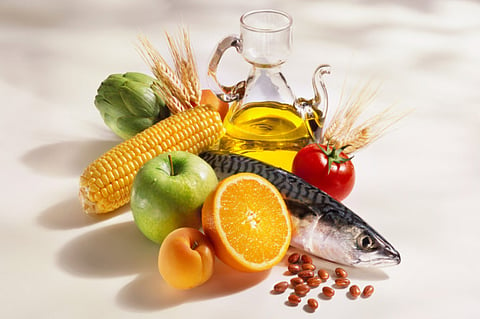Want to cut breast cancer risk? Try the Mediterranean diet
Fish, nuts, grains and olive oil can help protect against aggressive form of the disease, scientists find

More than 60,000 women were tracked over two decades by researches who found that those who ate a diet rich in fruit, vegetables, fish, nuts, whole grains and olive oil had a far lower chance of developing an aggressive form of the disease.
Every year 53,000 people in the UK are diagnosed with breast cancer, the most common cancer in women.
The study, backed by the World Cancer Research Fund, tracked women aged between 55 and 69. It found that those who stuck closest to a Mediterranean diet had a 40 per cent reduced risk of oestrogen-receptor-negative breast cancer. About one in three cases falls into this category, which has the highest risk of death.
A Mediterranean diet includes a high amount of plant-based proteins such as nuts, lentils and beans, whole grains, fish and monounsaturated fats — known as “good fats” — such as olive oil. It avoids refined grains such as white rice or white bread, red meat and sweets. Although the traditional Mediterranean diet involves moderate consumption of alcohol, in this study it was excluded from the criteria, as it is a known risk factor for breast cancer and is linked to 12,000 cases annually.
About 40 per cent of all cancers are linked to lifestyle and the risk of breast cancer is heightened by obesity, poor diet, alcohol and smoking.
Dr Panagiota Mitrou, director of research funding at the World Cancer Research Fund, said: “This important study showed that following a dietary pattern like the Mediterranean diet could help reduce breast cancer risk — particularly the subtype with a poorer prognosis.”
Prof Piet van den Brandt, lead researcher on the study at Maastricht University in Holland, said: “Our research can help to shine a light on how dietary patterns can affect our cancer risk.”
Emma Pennery, clinical director at Breast Cancer Care, called the findings “intriguing”. She said: “This study adds to evidence that a healthy diet, full of ‘good’ low-saturated fats, plays a part in lowering risk of the disease.” But she warned that women must be aware of the symptoms of breast cancer and contact their GP with any concerns.
Separate US research found that women already being treated for oestrogen-receptor-negative breast cancer could improve their survival chances by up to a fifth by eating a diet rich in soy. Its active ingredient is isoflavones, found in tofu, soy sauce, miso soup, soy milk and edamame beans.
The study was led by Dr Esther John, of the Cancer Prevention Institute of California, who said: “Whether lifestyle factors can improve survival after diagnosis is an important question for women diagnosed with this more aggressive type of breast cancer.
“Our findings suggest that survival may be better in patients with a higher consumption of isoflavones.”
Sign up for the Daily Briefing
Get the latest news and updates straight to your inbox



